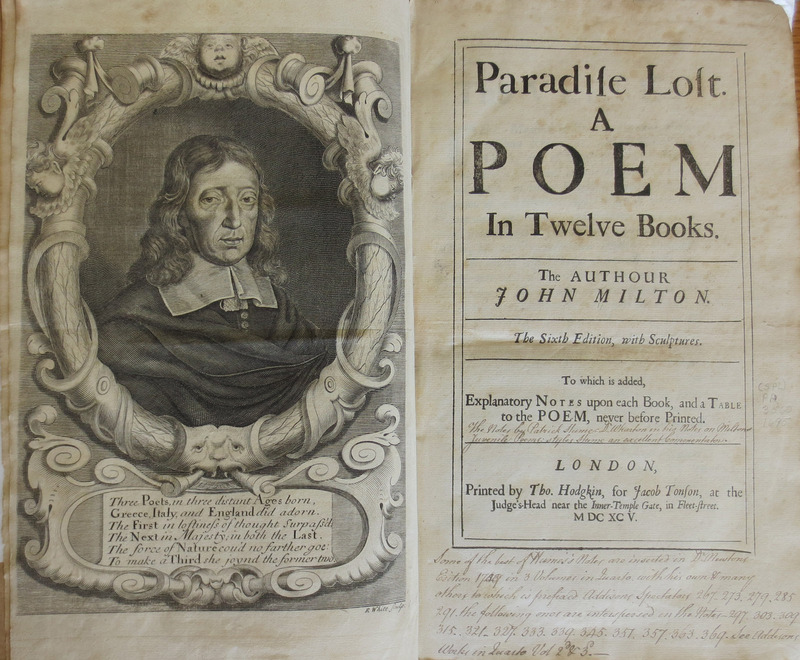Jacob Tonson
Jacob Tonson began his association with Milton's Paradise Lost in 1683 when he purchased half of the copyright license from publisher Brabazon Aylmer. Aylmer referred to Tonson as a young man destined to become "the greatest of English publishers" because of his dedication and commitment to publishing excellence.
Tonson did go on to become very well known as the chief publisher for John Dryden as well as his deluxe editions of Shakespeare, Spenser, Prior and other notable authors. However, when Tonson had to choose a text to hold in a self-commissioned portrait of himself, he chose Milton's Paradise Lost, the publication of which made him a very wealthy man.
Paradise Lost was not an overly popular book at the time Tonson purchased the copyright in 1683. It is believed his desire to purchase the rights to this work came more from a strong appreciation of Milton and his work than for financial gain. Tonson however, through his editions, convinced the English reading public of Milton's importance, secured Milton's reputation as one of England's greatest authors, and created a permanent place for Paradise Lost in the literary pantheon. His first edition (the fourth of Paradise Lost) was published in 1688 with financial partner Richard Bentley.
Due to his continuing success as a publisher, Tonson was able to purchase the remaining half of the copyright for Paradise Lost in 1690 and set about to widen Milton's appeal to a general audience. Tonson contracted with editors to add textual notes, indexes and other textual aids to ease the accessibility of the text for the reader. A serialized criticism appearing in the The Spectator and Tonson's introduction of smaller editions aimed at wider audiences increased the poets appeal tremendously.
Tonson's hold on Paradise Lost began to come to an end in 1709 after Parliament passed a new copyright act granting current copyright holders only 21 years of copyright before works by authors already deceased entered the public domain. The Tonsons (I, II, and III) fought this law citing discrepancies within it and managed to forestall almost all other English editions until 1749. During this time, Tonson and his heir and nephew, Jacob Tonson II, produced texts of every shape and size, with and without illustrations to a Milton-hungry public.
The elder Jacob Tonson retired in 1720, leaving the business to his nephew Jacob Tonson II. During the younger Tonson's tenure, the textual integrity of Paradise Lost deteriorated rapidly culminating with Richard Bentley's "revisionist" text of 1732. This edition was corrected by Thomas Newton's "authoritative" text of 1749. However, the physical quality of Tonson editions during this time remained high.
When Jacob Tonson II's son, Jacob Tonson III, took over the business at the mid-point of the eighteenth century, he watched the Tonson exclusive copyright on Paradise Lost slip away and did not exhibit the same tenacity shown by his father and great-uncle in publishing and the Tonson publishing house folded in 1760.
Much of the success of Milton's Paradise Lost can therefore be ascribed to Tonson's work as a publisher. Scholar A.W. Good summed up Tonson's work by writing:
By constantly encouraging critical activities upon the poem, [he] did much to prepare the way for the first variorum edition of Paradise Lost... Tonson made the poem attractive in form and appearance. He produced it in all sizes, from the handy pocket edition quarto, to the large ornamental edition folio. He used the best materials available, and probably engaged the best talent for the work of engraving and binding that the times could afford. He was constantly on the alert for new and helpful additions to the work in the way of notes and illustrations.

